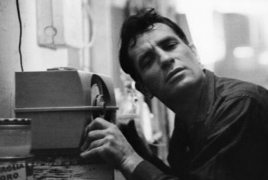Christie's announces the sale of Neal Cassady's letter to Jack Kerouac May 19, 2016 - 16:06 AMT PanARMENIAN.Net - Christie’s announces the sale of Neal Cassady’s 17 December 1950 “Joan Anderson Letter” to Jack Kerouac as a leading lot in the 16 June 2016 Books & Manuscripts sale at Rockefeller Plaza. The work will travel on a preview tour to Seattle from 31 May to 1 June, San Francisco from 2 to 4 June, Los Angeles from 6 to 9 June, and New York from 11 to 15 June. Thought long-lost, only resurfacing in 2012, it has permeated virtually every conversation about the Beat era since its writing. Referenced not only by Kerouac, but by Allen Ginsberg, Laurence Ferlinghetti, Herbert Hunke, and a host of their contemporaries, Cassady’s fluid, incantatory, and deeply revealing prose influenced the entire generation of Beat writers and gave Kerouac the model for his own literary revolutions. The compulsive and charismatic Neal Cassady played a powerful role in Kerouac’s finding his voice as a writer. The “Joan Anderson letter” revealed Kerouac’s path to an entirely new approach to writing, first attempted in On the Road, then developed and codified into the style he would term “spontaneous prose.” Kerouac famously hails its impact in an interview with Ted Berrigan, published in the Summer 1968 issue of The Paris Review: “It was the greatest piece of writing I ever saw,” continuing, “I got the idea for the spontaneous style of On the Road from seeing how good old Neal Cassady wrote his letters to me, all first person, fast, mad, confessional, completely serious, all detailed, with real names in his case, however (being letters).” Cassady’s letter had been written on a three-day Benzedrine high, Neal later confessed. It contained, by Jack’s first calculation, at least 13,000 words and ran to 40 pages. (The letter is mentioned in Part Five of On the Road.) Compelling, unaffected and discursive, it narrated Neal’s frenetic love life in 1946, particularly with Joan Anderson (whom he visited in a hospital after a failed suicide). Neal’s uninhibited, non-literary narrative pointed to the way to the free, truthful style to which Kerouac aspired. Only a fragment has been published, apparently copied by Kerouac before giving it to Ginsberg, in 1964 by John Bryan in his Notes from Underground #1. It was there called “The First Third,” and Bryan claimed that Cassady himself came to help print it. The title suggests that Cassady was considering it as the first portion of his ongoing autobiography. The same extract was published by City Lights in 1971 as an addendum to Cassady’s book The First Third and later formed the basis of the 1997 film The Last Time I Committed Suicide, directed by Stephen T. Kay, and starring Thomas Jane and Keanu Reeves. It is an understatement to state that Neal Cassady material is scarce at auction: it is unprecedented. No records of any sales are recorded in the online databases for any Cassady material, let alone for material of this literary consequence. The circumstances of its preservation and appearance at auction constitute a unique opportunity to acquire a foundational post-war literary manuscript that transcends its humble origins as a “letter.” The creative crew of the Public TV had chosen 13-year-old Malena as a participant of this year's contest. She called on others to also suspend their accounts over the companies’ failure to tackle hate speech. Penderecki was known for his film scores, including for William Friedkin’s “The Exorcist”, Stanley Kubrick’s “The Shining”. The festival made the news public on March 19, saying that “several options are considered in order to preserve its running” Partner news |